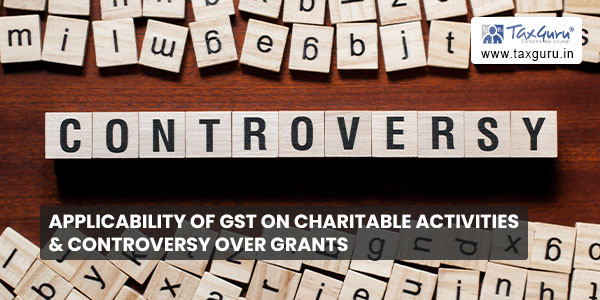The recent Maharashtra AAR with respect to M/s Jaishankar Gramin Va Adivasi Vikas Sanstha application, where the AAR has confirmed that grants received from Government is chargeable to GST@18%. The applicant being a charitable trust, the ruling is significant for us to understand what is a taxable supply and what is an exempted supply with respect to the receipts by a charitable trust or entity.
Before entering the discussion directly, let us first understand the basic concepts in GST.
The exemptions to GST on charitable activities are provided in the Notification No. 12/2017 CTR dated 28.06.2017. The first entry in the notification itself gives exemption to charitable activities as below:
“Services by an entity registered under section 12AA of the Income-tax Act, 1961 (43 of 1961) by way of charitable activities.”
Are all the charitable activities exempted as per the notification, the answer is no. Charitable activities for the purpose of this notification and exemption is defined as follows:
(r) “charitable activities” means activities relating to –
(i) public health by way of ,-
(A) care or counselling of
(I) terminally ill persons or persons with severe physical or mental disability;
(II) persons afflicted with HIV or AIDS;
(III) persons addicted to a dependence-forming substance such as narcotics drugs or alcohol; or
(B) public awareness of preventive health, family planning or prevention of HIV infection;
(ii) advancement of religion , spirituality or yoga;
(iii) advancement of educational programmes or skill development relating to,-
(A) abandoned, orphaned or homeless children;
(B) physically or mentally abused and traumatized persons;
(C) prisoners; or
(D) persons over the age of 65 years residing in a rural area;
(iv) preservation of environment including watershed, forests and wildlife;
Only the above-mentioned charitable activities are exempted from the levy of GST. Now the question may arise whether donations received by a charitable entity if providing other than any of the above services exempted?

In GST the taxable event is “supply” when the levy gets fructified. We need to understand first whether donations received falls under the term supply. Supply is not defined in GST but the scope of supply is given in Section 7 of the CGST Act, 2017. The scope is quite broad and is as below:
“Section 7(1) – For the purposes of this Act, the expression supply includes-
(a) all forms of supply of goods or services or both such as sale, transfer, barter, exchange, licence, rental, lease or disposal made or agreed to be made for a consideration by a person in the course or furtherance of business;”
Supply made or agreed for a consideration, meaning thereby supply of goods or services should be made on the condition for a consideration. Consideration is defined under section 2(31) of the CGST Act, 2017 as follows:
“Consideration” in relation to the supply of goods or services or both includes–
(a) any payment made or to be made, whether in money or otherwise, in respect of, in response to, or for the inducement of, the supply of goods or services or both, whether by the recipient or by any other person but shall not include any subsidy given by the Central Government or a State Government;
(b) the monetary value of any act or forbearance, in respect of, in response to, or for the inducement of, the supply of goods or services or both, whether by the recipient or by any other person but shall not include any subsidy given by the Central Government or a State Government:
Provided that a deposit given in respect of the supply of goods or services or both shall not be considered as payment made for such supply unless the supplier applies such deposit as consideration for the said supply;
Consideration is any payment made or agreed to made for the supply of goods or services or of any act or forbearance. Donations given voluntarily without any expectations from the donor cannot be termed as a supply, as there is no consideration paid for any supply of goods or services and the donations are made without any specific instructions. If donations are made with any specific instructions, then it takes the character of inducing an act and expecting something in return.
Whether GST is applicable on the service of display of name or placing of name plates of the donor in the premises of charitable organisations receiving donation or gifts from individual donor?
Circular No. 116/35/2019-GST dated 11.10.2019 throws some light on the subject as follows:
Representations have been received seeking clarification whether GST is applicable on donations or gifts received from individual donors by charitable organisations involved in advancement of religion, spirituality or yoga which is acknowledged by them by placing name plates in the name of the individual donor.
The issue has been examined. Individual donors provide financial help or any other support in the form of donation or gift to institutions such as religious institutions, charitable organisations, schools, hospitals, orphanages, old age homes etc. The recipient institutions place a name plate or similar such acknowledgement in their premises to express the gratitude. When the name of the donor is displayed in recipient institution premises, in such a manner, which can be said to be an expression of gratitude and public recognition of donor’s act of philanthropy and is not aimed at giving publicity to the donor in such manner that it would be an advertising or promotion of his business, then it can be said that there is no supply of service for a consideration (in the form of donation). There is no obligation (quid pro quo) on part of recipient of the donation or gift to do anything (supply a service).
Therefore, there is no GST liability on such consideration.
Some examples of cases where there would be no taxable supply are as follows:-
(a) “Good wishes from Mr. Rajesh” printed underneath a digital blackboard donated by Mr. Rajesh to a charitable Yoga institution.
(b) “Donated by Smt. Malati Devi in the memory of her father” written on the door or floor of a room or any part of a temple complex which was constructed from such donation.
In each of these examples, it may be noticed that there is no reference or mention of any business activity of the donor which otherwise would have got advertised. Thus, where all the three conditions are satisfied namely the gift or donation is made to a charitable organization, the payment has the character of gift or donation and the purpose is philanthropic (i.e. it leads to no commercial gain) and not advertisement, GST is not leviable.
The next important questions which were raised in the Advance Ruling was whether grants received from Government or others are taxable?
The AAR has said that when the grant received by charitable organisation is taxable. The issue which we have to understand here is, whether grants can take the colour of donation. Answer is no. Grants are given for specific purpose and there is an element of supply of service here. In this case State Government gives grant to the charitable entity (applicant) based on number of persons and they have laid down the guidelines for the usage of the grant. The grants made are with some conditions and expectations. Therefore, such grants will be taxable under GST.
The next issue which may arise is whether grants received by an educational institution are exempted?
The services of educations institutions are exempted by way of entry no. 66 in the Notification No. 12/2017 CTR dated 28.06.2017 as follows:
Services provided –
(a) by an educational institution to its students, faculty and staff;
(aa)by an educational institution by way of conduct of entrance examination against consideration in the form of entrance fee;”;
(b) to an educational institution, by way of,-
(i) transportation of students, faculty and staff;
(ii) catering, including any mid-day meals scheme sponsored by the Central Government, State Government or Union territory;
(iii) security or cleaning or house- keeping services performed in such educational institution;
(iv) services relating to admission to, or conduct of examination by, such institution; upto higher secondary:
(v) supply of online educational journals or periodicals:”;
Provided that nothing contained in entry (b) shall apply to an educational institution other than an institution providing services by way of pre-school education and education up to higher secondary school or equivalent.
Provided further that nothing contained in sub-item (v) of item (b) shall apply to an institution providing services by way of,-
(a) pre-school education and education up to higher secondary school or equivalent; or education as a part of an approved vocational education course Grants received by an educational institution will be exempted as long as the service provided by the institution is covered in the above entry. Though grants received by the educational institutions are for specific purpose, but the exemption is not covered in the entry no. 1 of the exemption notification but will be covered in entry no.66, which exempts the educational institutions if the service is provided to its students, faculty and staff. There is no separate service which an educational institution provides to the person giving the grant. So in my view the grant to educational institution will continue to be exempted.






can i claim ITC on purchase of fixed assets on which government grant received?
Important thing we need to keep in mind is fixed assets are used to provide exempted supply or taxable supplies or both? If exempted supply then we cannot take ITC, if taxable then ITC can be availed and if both then proportionate. Grants received for acquiring assets may not allow ITC to be availed. We need to follow Rule 43 for availing the credit
donations were given by a co under CSR or by firm and the name of the firm /co is displayed, is gst leviable?
does every display of names amount to the advertisement?
How and where the name is displayed plays very important role. If the display suggest only a gratitude and does not intend to give any publicity to the donor, then it may not be taxable. For example if at the office they list the names of the donors (many donors one by one in a list) it may not amount to advertisement, as this may be just an information or gratitude, but same donors name is prominently displayed, at a place where public can view it and is a good advertisement, then it may be taxable. The line is very thin and has to be seen on case to case basis.